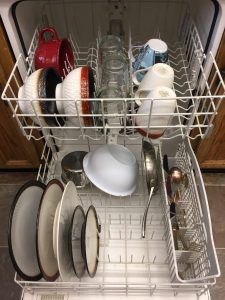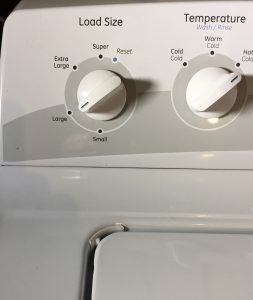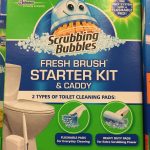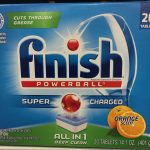By Chris Watson
If statistics count for anything, a bit of math tells us that we will spend around 39% of our lives living solo or in pairs (almost 60% of our adult lives). Much of that time is formative, either as a kid or raising kids. During those times we live in a world of piles of laundry, overflowing trash, stacks of dishes, and the stalking presence of the next rehearsal, game or meet, and weekend dance.
Now we don’t. Yet we act like we do. Our behaviors don’t just shift to “smaller” with our exit from home at 20 or our children leaving for college. Certainly this mindset affects how we shop and cook. However, it also affects how we do tasks around the house and what we keep on hand. Like cooking and shopping, to more effectively and enjoyably live solo or in pairs, we have to do some retraining when it comes to household tasks.
Rise of the Machines
It is the way we were trained as kids. Likewise, it is a necessity in a child driven, larger household. We view the machines in our houses as things that can only be used under certain conditions. Those conditions are set by need and, in some cases, an unrealistic idea that it is “wasteful” to use those machines in conditions other than “full”.
We begin with the dishwasher. When three or four live together filling a dishwasher is easy. With one or two it isn’t. This begins the cycle. You never seem to fill up the dishwasher so you end up not using it. However, you also hate doing dishes (especially if all you have is a cheap plastic strainer) so you start trying to figure out ways to not use dishes. The easiest way to do that is to get takeout or something frozen and presto: you have fallen into the small household trap! Then, in a clever and logical bit of self rationalization, you convince yourself that no one cooks for just one or two.

This trend is so common most of us don’t realize we are doing it. The answer? If you are fortunate to have one, run the dishwasher half full! Yes, half full dishwashers use as much water as full dishwashers but who cares. If running that machine, regardless of its “full” status, allows you the freedom to explore cooking and eating on a smaller scale, then do so with a vengeance. It is a thousand times better than a frozen Lean Cuisine. Plus dishwashers take away one of the worst aspects of cooking: doing the dishes. So run the dishwasher!
Speaking of half full, it is possible to do a half load of laundry. Let’s begin with a nod of sympathy. If you have to do your laundry outside your home, in a laundry room or a laundromat, then cram as much as

you can into those over priced machines and get the whole process done as quickly as possible. There isn’t a person over 20 who cannot sympathize on some level with the outside laundry experience.
That being said if you are blessed to have laundry facilities in your home then you now have permission to do half loads. Unlike with a large household where laundry is best described as “mounds”, we don’t need to live next to the laundry mountain. Washing machines have size settings for just this reason (although in a large household it is a good bet the dial has never been set to anything other than “super”). Yes, medium size loads take just as long to wash and dry but they are much easier to put away. Plus they keep our house neat and we have the clothes we want when we want them.
Finally, we have this thing called an oven. Yes, it seems like a big place when you are making a small casserole of scalloped potatoes. However, it will bake those potatoes just as well as a 24 lbs turkey. So use it! (See A Ham in the Kitchen). Or better yet, look into getting a toaster oven (See Size Matters: Part One). Regardless, you don’t need to use the oven for “big” things. Making your own casseroles is way better than buying something and microwaving it.

Habit Forming
These three machines for the core of what should good habits we practice in our smaller household. Many of these habits run counter intuitive to the way we grew up or when we had more people under our roof. However, when we live solo or in pairs, the goal is to be comfortable in our homes, regardless of the size. That means we need to cook more, keep clean, live more, and above all ENJOY our homes more. These ideas and habits include:
- Buy a good dish strainer, preferably metal. Even with the permission to run the dishwasher half full there are times when we just need to do a few things. A good, solid strainer will make this easy and not be an eyesore (or so flimsy that you are scared to use it)
- Take the trash out more often. When we live in a large household taking the trash out is a necessity. It is often overflowing. Not so with one or two. Yes you may use an extra bag or two but use them. Your cooking waste will go outside more often and there won’t be any “smells” that may keep you from enjoying your kitchen
- Buy convenient packaging. Think about moving to convenient items like throw away pads for cleaning, one pump cleaning soaps, dishwasher pods, laundry soap pods, etc. Back in the day when we were doing dishes constantly and running the laundry like an assembly line we needed the larger, less pricey soaps. We don’t’ need that anymore. The new wave of single “drop in” delivery systems is a blessing to a smaller household. Everything stays neater and we use up product at a reasonable rate.
- Clean as often. Even with less people houses get dirty. Granted, not kid dirty but dirty. A clean house makes us want to be in it. Cook, eat, read, watch a movie, invite friends over, all of the things that provide activity in our lives are made possible with a clean house. So get in the habit of cleaning as often as if we still had a household of teens.
- Shop Often. This is the single most important habit to form when living in solo or in pairs. Buy shopping often we don’t mean spend more. We mean shop two or three times a week and buy less. Get in the habit of blitzing great local, yet smaller markets and buying in quantities that are manageable (see Size Matters: Part Two). You will waste less, not run out of things (even soap), and probably eat and live healthier, as you will be buying fresh rather than cans and frozen junk.
Kits provide an ease in cleaning that encourage keeping our house neat and livable Pump cleaning supplies are very practical in the smaller household. With less laundry to do, prepackaged soaps and boosters are now practical in our size household Since we run the dishwasher less pods are a good solution to liquids Disposable cleaning and dusting pads are practical in the smaller household
Above all find ways to use and enjoy your home. The kitchen is the gateway but only the start. Whether we are trending away for our child raising years or just starting out, living solo or in pairs means still means living. We need to develop new habits, new shopping practices, and even retool our kitchen gear to live in this world of ones and twos.
And don’t worry about losing touch with your large and efficient household ways. If you do find yourself back in that situation they will come back in seconds if needed. Some never go away. I still stock enough popcorn to feed a high school.












